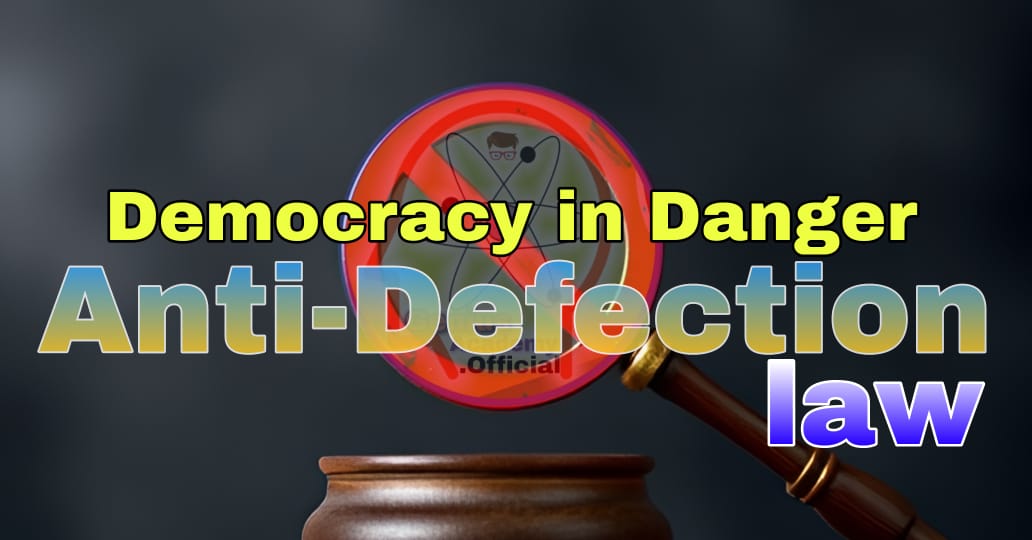Strengthening democracy by sharpening anti-defection law
Introduction
The Anti-Defection Law in India is a critical piece of legislation designed to prevent political instability and preserve democratic integrity by discouraging elected officials from frequently switching parties. However, over time, several loopholes and challenges have emerged within this law, often undermining its effectiveness. Strengthening the Anti-Defection Law and refining its provisions are essential steps toward a more robust democracy that values both stability and ethical governance.
Understanding the Anti-Defection Law
Historical Background
The Anti-Defection Law was introduced in India as part of the 52nd Amendment Act in 1985, which added the Tenth Schedule to the Indian Constitution. This move came after the rise of political defections, where legislators would frequently change party allegiances, leading to government instability. In particular, the infamous case of “Aaya Ram, Gaya Ram” in the 1960s highlighted this issue, with a Haryana legislator switching parties several times in one day. This practice threatened the credibility of democratic processes and necessitated a legal framework to curb defection.

Key Provisions of the Anti-Defection Law
The Anti-Defection Law sets out the conditions under which Members of Parliament (MPs) and Members of Legislative Assemblies (MLAs) can be disqualified for defection:—
- Voluntary Resignation from Party Membership:— If an elected official voluntarily resigns from the party on whose ticket they were elected, they face disqualification.
- Disobeying Party Directives on Crucial Votes:— A member can be disqualified for voting against the directives of their party on key issues like confidence motions and budget votes.
There is, however, an exception: if at least two-thirds of a party’s legislators agree to a merger with another party, they can avoid disqualification. This rule aims to allow significant consensus-based decisions without penalizing legislators for their collective will.
Major Issues with the Current Anti-Defection Law
(1) Loopholes and Manipulation
Despite its intentions, the Anti-Defection Law has several weaknesses. Before amendments, the law allowed a one-third split of party members to form a new faction without disqualification. This was exploited until the 91st Amendment Act of 2003, which raised the requirement to two-thirds. However, even with this revision, legislators sometimes misuse the merger provision to circumvent disqualification, manipulating the system to gain political advantages.
(2) Role of the Speaker and Possible Bias
The responsibility of determining disqualification under the Anti-Defection Law falls on the Speaker of the legislative house. Since the Speaker is often affiliated with the ruling party, allegations of bias frequently arise. In some instances, decisions on defection cases have been delayed or deemed politically motivated, creating distrust in the Speaker’s impartiality and undermining the law’s intent.
(3) Judicial Delays and Lack of Fixed Timeframes
Defection cases are often challenged in court, leading to prolonged legal battles that delay resolution. Moreover, there is no set timeframe within which the Speaker must make a decision on disqualification, allowing some cases to drag on indefinitely, further eroding the law’s effectiveness.
(5) Restriction of Freedom of Expression
The Anti-Defection Law can also be criticized for limiting legislators’ freedom of expression. In requiring them to strictly adhere to party directives, the law prevents MPs and MLAs from representing the interests of their constituents or expressing dissent within their party, even on matters of conscience.
(6) Ethical Concerns and Unethical Political Practices
Although the Anti-Defection Law was introduced to curb unethical practices, legislators often still switch allegiances for personal or political gain. Political parties, meanwhile, sometimes engage in “poaching” members from rival parties, thereby subverting the law’s original intent.
(7) Impact on Democratic Values
The law’s rigid emphasis on party loyalty over individual judgment can stifle healthy debate and dissent within parties, discouraging legislators from voicing concerns that may be critical for democracy. In instances where party directives conflict with a legislator’s ethical stance or constituency interests, the law can force compliance at the expense of authentic representation.
Amendments and Reforms in the Anti-Defection Law
(1) 91st Amendment Act, 2003
The 91st Amendment Act was a significant reform, requiring a larger consensus for party mergers by mandating a two-thirds majority. This amendment closed the earlier loophole that allowed smaller groups to split from the party without disqualification, thereby discouraging minor defections.
(2) Kihoto Hollohan vs. Zachillhu (1992)
In the landmark Kihoto Hollohan vs. Zachillhu case, the Supreme Court upheld the Speaker’s power to decide defection cases but emphasized that this discretion should not be arbitrary. This ruling underscored the need for impartiality in the Speaker’s decisions while reinforcing the Speaker’s authority in defection matters.
Proposed Reforms for Strengthening the Anti-Defection Law
To make the Anti-Defection Law more effective and impartial, the following reforms have been suggested:—
(a) Establishing an Independent Adjudicatory Body
One solution to reduce potential bias is creating an independent tribunal to handle disqualification petitions, rather than assigning this role to the Speaker. An impartial body would increase public trust in the adjudication process and avoid the perception of partisan decisions.
(b) Implementing Clear Definitions
A lack of clarity regarding terms like “voluntary resignation” and “defection” has often led to varied interpretations. Providing precise definitions within the law can reduce ambiguity, ensuring consistent application and preventing misuse.
(c) Setting Fixed Timeframes for Adjudication
Introducing a specific timeframe within which defection cases must be resolved would prevent delays. Setting deadlines for both the Speaker (or tribunal) and courts in handling defection cases would enhance efficiency and reduce instances where cases are stalled for long periods.
(d) Encouraging Periodic Review
As with any law, periodic review of the Anti-Defection Law would allow it to evolve with changing political dynamics and address emerging loopholes. A structured review process would enable lawmakers to amend provisions as needed to maintain the law’s relevance.
(e) Promoting Transparency and Accountability
Making records of defection cases and decisions publicly accessible can help build trust in the process. Increased transparency can prevent arbitrary decisions and hold decision-makers accountable for their actions. It would also allow the public to scrutinize the rationale behind judgments on disqualification.
(f) Supporting Internal Democracy within Parties
Encouraging more robust internal democracy within political parties can help address grievances without pushing legislators to defect. Allowing legislators to express dissent within their party without fear of punitive actions can reduce the need for defection as a means of voicing disagreement.
(g) Establishing Ethical Guidelines and Enforcing Penalties
To curb unethical practices, it’s essential to implement strong ethical guidelines for legislators. Additionally, penalties for political parties and legislators engaged in “poaching” could deter parties from encouraging defections and create a more disciplined political environment.
Conclusion and Way Forward
The Anti-Defection Law is instrumental in upholding stability within India’s democratic framework. However, to continue serving its purpose effectively, it requires periodic reform to address its weaknesses. The establishment of an impartial adjudicatory body, clear definitions, fixed timeframes for resolving cases, transparency in decision-making, and an emphasis on internal party democracy are essential steps toward a more balanced and effective law.
Additionally, ethical guidelines and accountability measures would help curb unethical practices and reinforce democratic integrity. By refining the law to accommodate the changing political landscape, India can strengthen the values of accountability, representation, and integrity essential to any thriving democracy. Continuous improvement of the Anti-Defection Law, coupled with vigilant enforcement, will ensure that it remains a valuable tool in preserving the stability and fairness of democratic institutions.

Zeroing in on Methane Diplomacy: India’s Role at COP29

